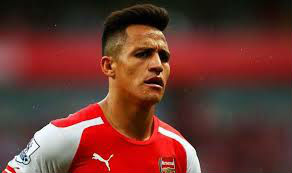 Arsenal’s Premier League campaign takes them up and down the country from Sunderland to Southampton this season but it is no exaggeration to say the viability of their title challenge could be decided 7,250 miles away in Santiago on Tuesday night.
Arsenal’s Premier League campaign takes them up and down the country from Sunderland to Southampton this season but it is no exaggeration to say the viability of their title challenge could be decided 7,250 miles away in Santiago on Tuesday night.
Chile take on Uruguay in a World Cup qualifier which has become arguably more important to Arsenal than the weekend’s upcoming meeting with Manchester United.
It is in this game that Alexis Sanchez could take the field for his country just days after suffering a muscle tear in training — what would be “a suicidal decision” according to an alarmed Arsene Wenger, who has been trying to establish the severity of an injury which he has been told is a hamstring problem.
It is a very real fear. Last season, Arsenal lost Sanchez for six weeks due to a hamstring problem, leaving him sidelined over the busy festive season from Nov. 29 all the way until Jan. 24. He missed 11 matches in total and while Arsenal won seven of those games and lost only two, you can only conclude that the consequences of a similar absence this time around would be dire.
Last year, Sanchez had only scored in one of his previous eight matches before suffering his injury. He was still floating around on the left and struggling with his form. A year on he is a player transformed and if Arsenal lose him, they lose the focal point of their attack, the False No.9 who has made everything click in the final third.
The trouble, though admittedly it is a virtue on other occasions, is that Sanchez never wants to rest. Even when wearing heavy strapping as he was in training with Chile over the weekend, sitting on the bench is not a thought which ever crosses his mind. He wants to play in every second of every game. Jose Mourinho made headlines last week when publicly calling out Luke Shaw and Chris Smalling for not showing the requisite bravery to play on through injury problems; with Sanchez he would not have one word of complaint. He doesn’t know when to stop, and that’s a problem.
Just days before his injury,Sanchez admitted that he was reluctant to listen to Wenger’s warnings about his fitness. “He tells me I must rest, but I don’t like that,” he said.
“I don’t want to rest, especially not during the matches. I want to be out there. If I don’t play I get very angry and I come home from the match very sad.”
If Wenger is struggling to get his message across to Sanchez, the same is likely to be true of Chile. Despite winning the past two Copa Americas, the country are currently only fifth in their World Cup qualifying group and Sanchez is their best attacking player. A home win against Uruguay is essential and their next competitive match is not until March, meaning any further injury suffered by Sanchez would likely not affect them.
Given the importance of qualifying for the World Cup — not only for the sporting glory it entails but the financial rewards for the federation — it is perfectly understandable that Chile will push Sanchez to play. Arsenal pay his wages, yes, but his nation relies on him too. It is why Wenger may be fighting a losing battle, unless the injury is simply too serious to allow him to play.
In any case, Wenger is not exactly in a position of strength to argue about effectively managing injuries. He announced Sanchez was in the dreaded injury “red zone” in December 2014 and he played 10 matches in the following six weeks. Rather more seriously, it is only two months since Wenger conceded that he “pushed” Aaron Ramsey back to action too early on the first day of the season against Liverpool as the midfielder picked up a hamstring injury — a familiar tale when it comes to the Welshman.
Really, all Arsenal can do is keep their fingers crossed. If Chile think he is even half-fit then Sanchez could play and Arsenal will be watching on with trepidation as the man who has eight goals and five assists in 14 starts this season drags his heavily strapped leg on to the pitch in service of his country.
If the worst happens, Arsenal have no replacement without changing the system which has given them a more threatening complexion this season. Olivier Giroud has his own qualities but his presence at centre-forward changes the way Arsenal play and the angles at which they attack. It is the model which has proven to be insufficient at this level. With Sanchez fit they have something better. Which is why Chile’s match against Uruguay will be one of Arsenal’s most important fixtures this season.
Support InfoStride News' Credible Journalism: Only credible journalism can guarantee a fair, accountable and transparent society, including democracy and government. It involves a lot of efforts and money. We need your support. Click here to Donate
